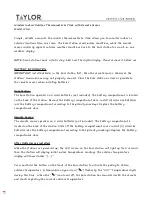
Inside
Mo
Hold
AM
Heat
HEAT
Set To
MENU
MODE
NEXT
ENTER
SYSTEM
Rev A Mar 2017
Model T200WLD
Wireless Thermostat
UP
DOWN
to set the temperature and
set options.
and
Keys. Used
SYSTEM MODE
select OFF, HEAT or COOL for
automatic airflow control based on the
temperature setting and system mode..
Key. Used to
INSTALLER
select options.
Key. Used to
Temperature Setting.
Current inside temperature.
Indicates DAYTIME or NIGHTTIME
operation.
Indicates SCHEDULE or
HOLD Mode
MENU
and the daytime schedule.
Key. Used to set time of day
THERMOSTAT MODE
SCHEDULE or HOLD operation.
Key. Selects
NEXT
time of day and schedules.
Key. Used to set
Battery compartment, 2 AA batteries.
ENTER
day and daytime schedules.
Key. Used to set time of
Direct Damper Control
User / Installer Manual
Model T200WLD and R80DWL
The Wireless Thermostat, T200WLD, automatically
controls airflow into a space wirelessly using a
wirelessly controlled, modulating damper installed in the
duct supplying airflow to the space. The thermostat
maintains the temperature using the system mode and
setpoint temperature set by the user, and the space
temperature.
Automatically controls airflow based on selected
system mode - Heat, Cool or Off.
Wireless range is 125’ in a home or building.
7-day programmable schedule for daytime and
nighttime airflow control. Automatically lower airflow
on days when a space is not used.
A home Address can be used when two or more
installations are within 300’ of one another.
Dampers are powered by 24VAC transformer. 40VA
transformer can power 10 dampers.
Control airflow to home offices, garages, multi-media
rooms or unused bedrooms.
Control airflow to conference rooms, spare offices or
any space that is not used continuously.
Control airflow to spaces and eliminate overheating
and overcooling and provide improved comfort.
Model R80DWLXX
Wireless Control Damper
Thermostat is battery operated and requires no wiring.
Inside
Mo
Hold
AM
Heat
HEAT
Set To
MENU
MODE
NEXT
ENTER
SYSTEM
Caution! Direct Damper Controls are not an
alternative to zoning. Installing too many controls on
a single HVAC system could cause airflow and
pressure problems.


























